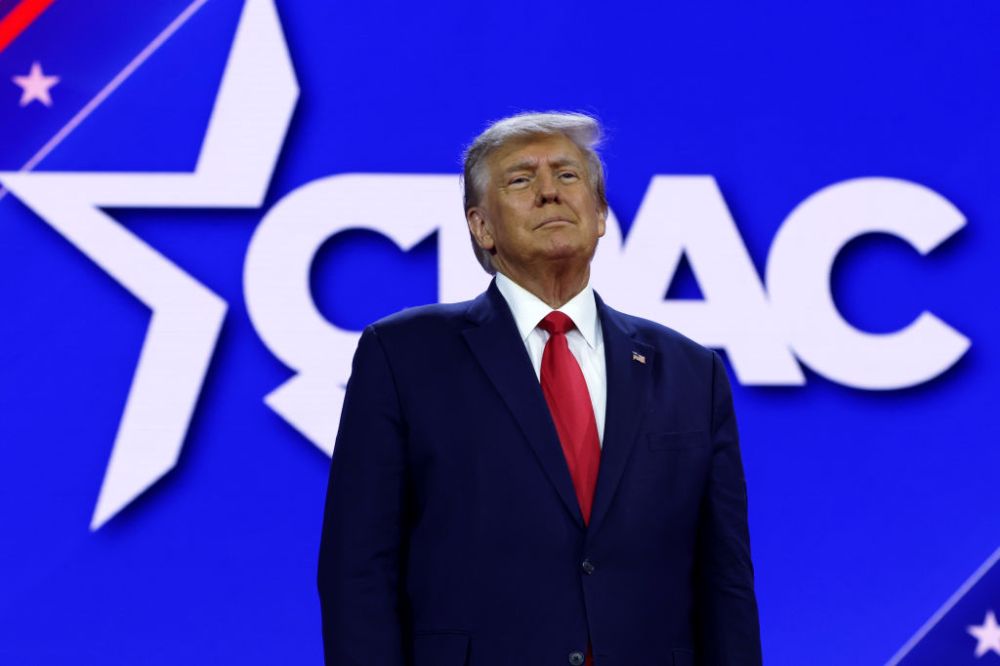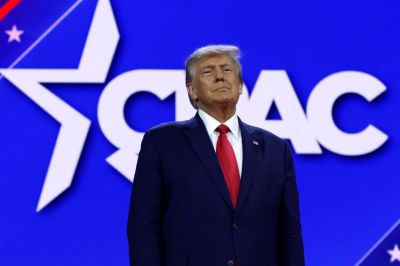Happy Monday! When not playing golf, former President Donald Trump reportedly spends much of his time brainstorming nicknames for his biggest rival, Florida Gov. Ron DeSantis. Bloomberg’s Nancy Cook has the scoop: “Trump, allies say, seems set on ‘Ron DeSanctimonious,’ even though others around him don’t think it’s a bullseye. Some of the new ideas the former president has entertained: ‘Ron DisHonest.’ ‘Ron DeEstablishment.’ Or even, ‘Tiny D.’”
Up to Speed
- Speaking of DeSantis, the Florida governor walked back his prior support for privatizing Social Security and Medicare, telling Fox News on Thursday: “We’re not going to mess with Social Security as Republicans. I think that that’s pretty clear.” While in Congress, DeSantis voted in multiple nonbinding budget resolutions to raise the minimum age for retirement benefits to 70.
- After teasing a prospective presidential bid, former Maryland Gov. Larry Hogan announced Sunday he will not seek the Republican nomination in 2024. He said it’s time for the party to “move on from Donald Trump” but warned too many GOP candidates could split the primary vote in the 45th president’s favor. “There are several competent Republican leaders who have the potential to step up and lead,” Hogan said. “But the stakes are too high for me to risk being part of another multicar pileup that could potentially help Mr. Trump recapture the nomination.”
Trump/DeSantis Weekend Speeches
OXON HILL, Maryland—Many likely GOP presidential contenders are testing messages these days positioning themselves as heirs, not antidotes, to former President Donald Trump and his MAGA movement. But at the Conservative Political Action Conference Saturday, Trump took direct aim at those nascent campaign messages: Accept no substitutes.
“Our enemies are lunatics and maniacs,” Trump said during his marathon speech. “They cannot steer me. They cannot shake me. And they will never ever control me. And they will never ever therefore control you. At the end of the day, anyone else will be intimidated, bought off, blackmailed, or ripped to shreds. I alone will never retreat.”
For nearly two hours, Trump cast himself as the sole hope for a nation on one side beset by Democrats—who, since President Joe Biden took office, have driven America into “a Marxism state of mind, a communism state of mind”—and on the other side “a Republican Party that was ruled by freaks, neocons, globalists, open-border zealots, and fools.”
“In 2016, I declared I am your voice,” Trump continued. “Today I add, I am your warrior, I am your justice, and—for those who have been wronged and betrayed—I am your retribution.” The former president’s January 20, 2017, inaugural address seemed almost quaint by comparison.
The CPAC crowd was ready to hear it. The gathering has morphed into an ever-purer Trump lovefest in recent years that lives up to its nickname: “TPAC.” In this year’s straw poll, he outstripped second-place finisher Ron DeSantis 60 percent to 20 percent. (The vice presidential poll winner? Failed Arizona gubernatorial candidate Kari Lake, who spoke twice at the conference and, like Trump, refuses to concede defeat.)
That didn’t prevent some other candidates, both declared and potential, from showing up to make their case to the assembled activists.
Former South Carolina Gov. Nikki Haley was received politely by the crowd when she took the stage Friday in a speech taking aim at “socialist Democrats” who “want to take our freedom,” repped her proposal for mental competency tests for older politicians, and vowed to stop giving aid to “countries that hate America.” But she had a rougher time out in the hotel lobby, where hecklers started a “We Love Trump!” chant as she paused for handshakes and selfies with well-wishers. When the straw poll results were announced Saturday immediately ahead of Trump’s speech (Haley clocked 3 percent), the crowd cheerfully booed her name.
Former Secretary of State Mike Pompeo spoke Friday too, as did presidential candidate Vivek Ramaswamy.
DeSantis himself—possibly wanting to avoid the Haley treatment, and possibly in search of a plausible explanation for getting walloped in the straw poll—steered clear of CPAC altogether. But on Sunday he counterprogramed Trump’s stemwinder with a notable speech of his own delivered at the Ronald Reagan Presidential Library, a longstanding early visit spot for GOP presidential hopefuls.
DeSantis is not yet running for president, and his speech was filled not with promises of future victories but with a recounting of past ones in Florida—from his COVID record to his fights against the Walt Disney Company.
“I sat down at my desk the first day as governor over four years ago, I looked around the office, and I said, ‘I don’t know who’s going to succeed me here, but they are not going to have very much to do because I am not leaving any meat on that bone. I am going to take care of all the business that I possibly can,’” DeSantis said.
He didn’t mention Trump, but DeSantis did offer one veiled critique of the former president’s governing style—the sort of thing that could form the skeleton of a presidential pitch.
“In four years, you didn’t see our administration leaking like a sieve, you didn’t see a lot of drama or palace intrigue,” DeSantis said. “What you saw was surgical precision execution, day after day after day. And because we did that, we beat the left day after day after day.”
Joe Biden Gets a Democratic Primary Challenger
Marianne Williamson, the spiritual thought leader and self-help author who ran unsuccessfully for president in 2020, officially launched her Democratic primary challenge against President Joe Biden on Saturday in the nation’s capital.
In a fiery speech delivered to several hundred supporters in Union Station—notably without notes or a teleprompter—the 70-year-old ticked off progressive campaign priorities: free universal child care, free college, and the like. She also spent much of her speech denouncing corporate lobbyists and America’s “sociopathic economic system.”
Williamson maintains she’s keenly aware of her underdog status in the race after her unsuccessful campaign last cycle, when she ran on creating a Department of Peace and urged supporters to “harness love” to defeat Donald Trump at the ballot box. (She dropped out before the primaries kicked off and later endorsed Bernie Sanders.)
She made no mention of Biden—who is expected to announce his reelection bid soon—though she made clear in her speech that she’s undaunted by a longshot rematch against the sitting president.
“I am not naïve about these forces which have no intention of allowing anyone into this conversation who does not align with their predetermined agenda,” she said. “I understand that, in their mind, only people who previously have been entrenched in the car that brought us into this ditch can possibly be considered qualified to bring us out of it.”
As do all campaign events featuring unorthodox candidates, Williamson’s presidential launch attracted lots of folks who mainly wanted to see what all the fuss was about.
Riley Kruse just moved to D.C. and thought it would be “cool to see a presidential candidate” in person. “She’s kind of an interesting speaker,” he said. “I don’t really agree with her, but I don't know.” Saturday’s speech, he said, made clear that Williamson has reoriented her pitch. “It’s definitely more aggressive than 2020, seems more serious. But I just don’t think it’s that serious.”
Katie Zackerman also came Saturday out of curiosity. After “a very fun speech to watch,” Zackerman is still doubtful that Williamson’s campaign is “really gonna influence anything.” But Williamson’s biggest supporters insist the former spiritual adviser to Oprah Winfrey shouldn’t be underestimated.
“Marianne’s like my closest friend from growing up, so I believe in everything she has to say,” said event attendee Geri Roper. “She’s embarking on a really difficult road because the world is as it is. She’s got a tough challenge ahead of her but if anybody can do it, she can.”
Ohio’s Top Elections Official Mulls 2024 Senate Bid
Republican Frank LaRose, the Ohio secretary of state, is plotting a campaign to challenge heavyweight Democratic Sen. Sherrod Brown in 2024 and plans to launch a bid in the months ahead.
“I’d love to serve in the U.S. Senate, but what I have to do is explore if I can raise the money. I think I can,” LaRose, 43, told The Dispatch Friday in a telephone interview. “Right now, I’m in the exploring phase, and putting the team together.” That phase included a weekend visit to CPAC, where LaRose appeared on an election integrity panel titled “They Stole it From Us Legally.”
LaRose recently met with Sen. Steve Daines of Montana, chairman of the National Republican Senatorial Committee, and he remains in regular contact with the Senate GOP campaign arm.
Competing with wealthy, self-funding candidates in the Republican primary like state Sen. Matt Dolan—never mind Brown—would require big money. LaRose is currently spending “a couple of hours a day talking to donors” to gauge the financial support he can expect for a 2024 campaign.
Ohio has become a red state since the rise of former President Donald Trump; it’s not the Midwestern battleground it was when Brown, 70, won his first Senate term in 2006. Still, LaRose acknowledges Brown is a “savvy retail politician” capable of winning reelection in the Buckeye State, even amid presidential-level voter turnout that should benefit the GOP ticket. LaRose’s pitch is that he is uniquely qualified to oust the formidable incumbent.
“Brown is beatable if my party nominates the right candidate. That means someone with the demonstrated ability to win statewide,” LaRose said. “We need someone who can appeal to crossover voters.”
LaRose can boast impressive credentials. He is a former Green Beret and active Army Reservist who served on international observation committees monitoring elections in Nigeria and Ukraine. Politically, he has deep connections with grassroots Republicans and establishment GOP figures across Ohio’s 88 counties, a product of eight years in the state Senate and two successful campaigns for secretary of state. In 2022, LaRose was the only incumbent secretary of state to be endorsed by Trump.
That last bit could come in handy.
In Ohio’s 2022 GOP primary, a crowded affair, Trump’s endorsement propelled now-Sen. J.D. Vance to the nomination. Naturally, LaRose welcomes the former president’s support. But the secretary is wary of participating in another version of that contest, saying it would jeopardize his prospects against Brown. Vance cruised to a 6.6 percentage point victory but underperformed Republican Gov. Mike DeWine by 9.5 points, a disparity blamed partly on his lack of resources.
“What I’m not interested in is a seven-way, $70 million primary,” LaRose said. “Our nominee emerged from that with almost no money.”
Meanwhile, Republican officials in Washington, D.C., like what they see from LaRose. “If he’s able to put money together for this primary, national Republicans think he would be a formidable candidate,” a GOP operative in the nation’s capital said.
Senate GOP Fundraising Pitch Slights Romney
Sen. Mitt Romney gets a lot of grief from a lot of Republicans these days, mostly as a result of his longstanding public opposition to former President Donald Trump. One place you wouldn’t expect to see that sort of feud boil over is in fundraising materials for the National Republican Senatorial Committee, the campaign entity that exists to help Republicans win Senate control by buttressing the campaigns of incumbents like Romney himself.
But, well, take a look at this image:

It appeared recently on WinRed—the Republican-aligned Internet fundraising platform—on a page promoting a joint fundraising committee established to collect resources for the NRSC and the 10 GOP incumbents up for reelection this cycle. That’s Romney there in the bottom left, peering over the shoulder of Missouri Sen. Josh Hawley, a Trump acolyte.
Had the goof involved almost any other Senate Republican, it might be possible to write it off as an honest mistake. But given the ongoing friction between Romney and the GOP’s ascendant populists, the image seems a deliberate slight by whoever created the graphic. It’s a reminder of the ongoing intraparty tension roiling Republicans—if not always in plain view, than beneath the surface.
Romney’s office declined to comment, referring questions to the NRSC. None too pleased, the NRSC said the original graphic was generated by an outside firm, not the committee’s in-house digital team, and posted mistakenly and without its consent. “This was an inadvertent error made by a vendor and it was immediately fixed when it was brought to our attention,” NRSC communications director Mike Berg told The Dispatch. “We regret the error.”
Eyes on the Trail
- Democrats tussle over D.C. crime bill ahead of 2024: President Joe Biden said Thursday that he will not thwart Republican efforts to overturn D.C.’s new crime bill, which lowers criminal penalties for carjackings and grants those facing jail time for misdemeanors the right to a jury trial, among other controversial measures. (D.C. Mayor Muriel Bowser’s veto of the bill was overridden earlier this year by D.C.’s ultra-progressive city council.) Biden’s decision to break from the overwhelming number of House Democrats who opposed the bill, plus most Senate Democrats—except for a handful who are up for reelection—reflects the party’s struggle to project a tough-on-crime message ahead of 2024, now less than a week after Chicago Mayor Lori Lightfoot lost reelection over her approach to urban crime. “I support D.C. Statehood and home-rule—but I don’t support some of the changes D.C. Council put forward over the Mayor’s objections—such as lowering penalties for carjackings,” Biden said in a tweet on Thursday. “If the Senate votes to overturn what D.C. Council did – I’ll sign it.” The Senate could take up the bill as soon as this week. Democratic Sens. Joe Manchin of West Virginia, Mark Kelly of Arizona, Patty Murray of Washington, Bob Casey of Pennsylvania, and Tammy Baldwin of Wisconsin have already said they’ll side with Biden in voting to repeal it. (Sens. John Fetterman and Dianne Feinstein are both out.)
Notable and Quotable
“That’s ridiculous. … We would never even discuss something like that.”
—First Lady Jill Biden in a CNN interview airing tonight on Nikki Haley’s proposed mental-competency test for older political candidates (and whether her husband would ever take one).








Please note that we at The Dispatch hold ourselves, our work, and our commenters to a higher standard than other places on the internet. We welcome comments that foster genuine debate or discussion—including comments critical of us or our work—but responses that include ad hominem attacks on fellow Dispatch members or are intended to stoke fear and anger may be moderated.
With your membership, you only have the ability to comment on The Morning Dispatch articles. Consider upgrading to join the conversation everywhere.